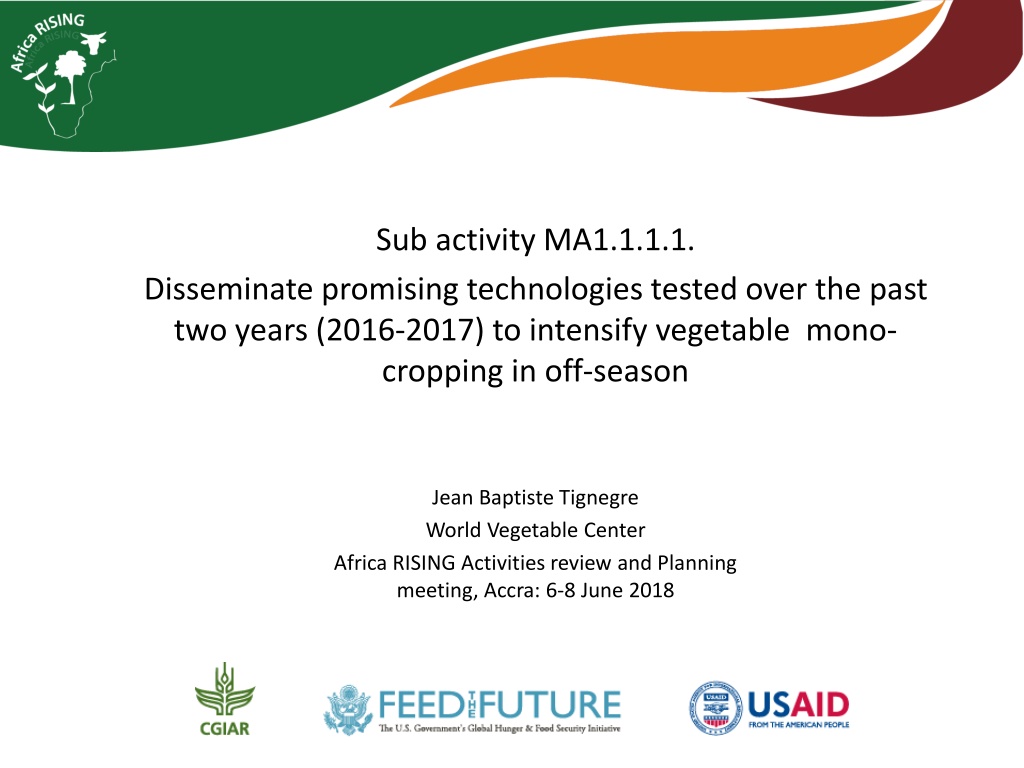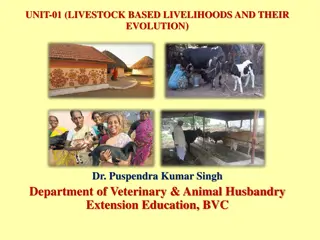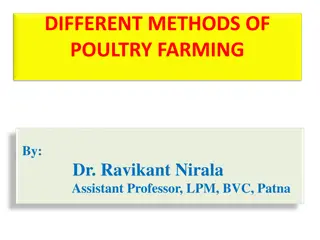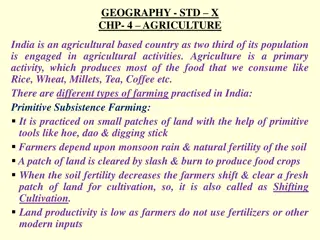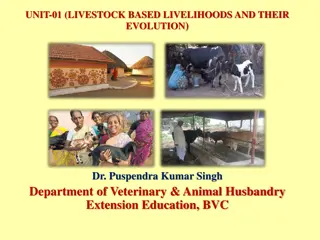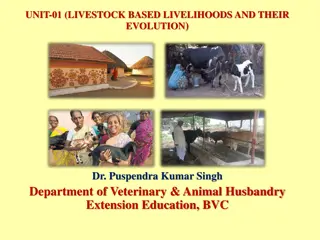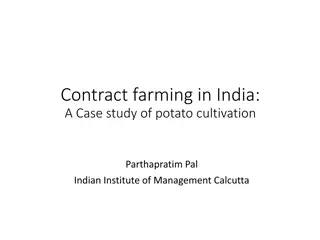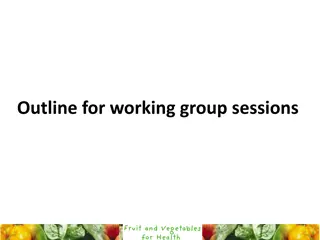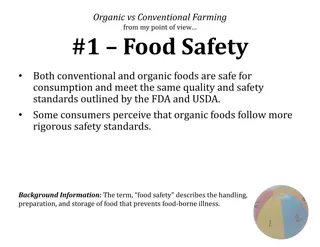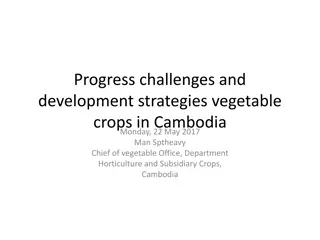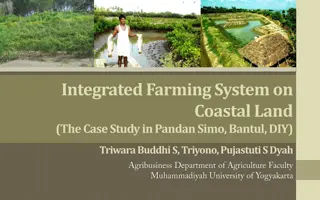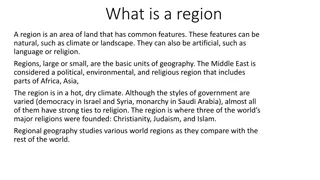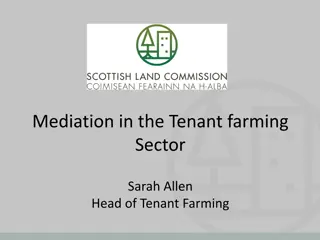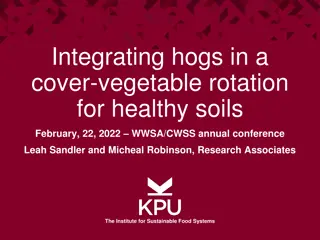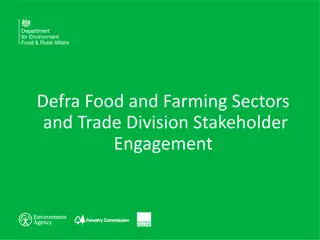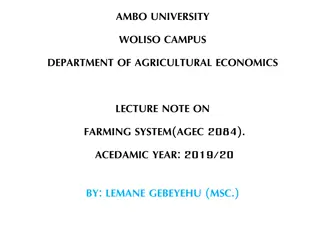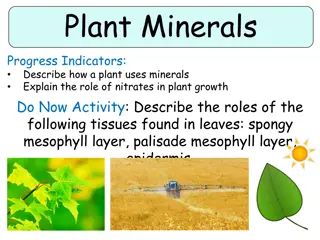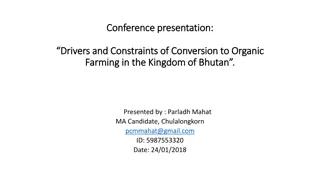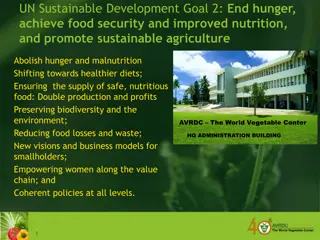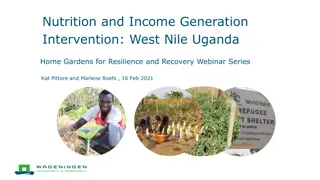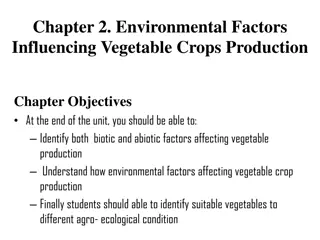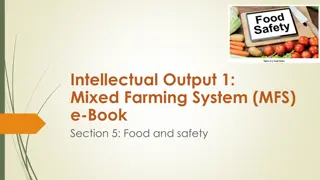Enhancing Vegetable Farming Practices in Ghana's Upper East and Northern Regions
Dissemination of tested technologies to intensify vegetable mono-cropping in off-season, focusing on adapting crop and livestock practices to enhance smallholder productivity. Activities include identifying adapted vegetable varieties, conducting trials, and documenting farmer preferences. The project aims to increase crop yield, profitability, and gender equity while linking to nutrition-sensitive agriculture. Estimated fund requirement is 70,913,000 USD.
- Vegetable Farming
- Crop-Livestock Systems
- Technology Dissemination
- Smallholder Productivity
- Nutrition-Sensitive Agriculture
Download Presentation

Please find below an Image/Link to download the presentation.
The content on the website is provided AS IS for your information and personal use only. It may not be sold, licensed, or shared on other websites without obtaining consent from the author. Download presentation by click this link. If you encounter any issues during the download, it is possible that the publisher has removed the file from their server.
E N D
Presentation Transcript
Sub activity MA1.1.1.1. Disseminate promising technologies tested over the past two years (2016-2017) to intensify vegetable mono- cropping in off-season Jean Baptiste Tignegre World Vegetable Center Africa RISING Activities review and Planning meeting, Accra: 6-8 June 2018
Outcome no._1 Output no._ 1.1 Activity no._ 1.1.1 Sub-activity title Sub-activity: Ghana 1.1.1.1 Test, disseminate and adapt crop, livestock and integrated crop-livestock technologies and practices to increase and sustain productivity of smallholder crop-livestock farming systems Location/sites for sub-activity Upper East and Northern Regions in Ghana Implementation timeframe (start/end date) 1st May 2018-30 April 2019 Deliverables 3.Field days organized 1.Field trials established 2.Database on vegetables S.I. domain and indicators for which data was collected indicate metric and scale 4. _ _ _ 5. _ _ _ 6. _ _ _ 1. Productivity (Crop yield and cropping intensity at the plot and farm levels) 2. Economic (Profitability and input use efficiency at the plot and farm levels) 3. Social (Gender equity at the farm and household level) Research team and responsibilities 3. MOFA 4. IWMI 1. WorldVeg 2. IITA Farming systems research perspective (how this work links with others) This activity links to nutrition sensitive agriculture. It aims at providing adapted varieties to overcome malnutrition and generate income Estimated fund requirement 70 913,000 USD
1. Identification of varieties of vegetable crop species adapted to the Upper east and Northern Regions of Ghana under rainfed conditions Objective: test/disseminate rainfed tomato and pepper demonstration fields for selected high-yield and disease- resistant varieties Target beneficiaries: Ninety farmers in the communities in thee UER & NR Field design: randomized complete blocks with farmers as replicates. Varieties tested: 3 improved varieties of each species including farmers' variety as the control. Farmers PVS will be organized to document farmers' preferences for improved varieties and production practices. Data: yield, varietal performances to plant diseases, and farmers preferred traits.
2. Conduct dry season vegetable crops in Northern Ghana using vegetable hubs and other surface water (dams, lakes) About 80 variety trials will be conducted at the Vegetable Hubs and farmers fields in the Upper East and Northern Regions Varieties tested: 3 varieties of tomato and pepper to select performing varieties. Field layout: RCBD with 3 replications Separate trials will be conducted for varieties of each crop species using farmers' variety as control. Data: yield, plant diseases, and farmers preferred traits. Field days & PVS will be organized to document male and female farmers' preferences for the various characteristcs.
3. mprove capacity of vegetable farmers on vegetable gardening, post harvest handling and processing techniques This activity will improve the capacity of vegetable farmers through training on vegetable gardens. The training sessions will focus on good agricultural practices for the implementation of nurseries, production itinerary, post-harvest and vegetable processing
Sub activity MA1.1.1.1. Disseminate promising technologies tested over the past two years (2016-2017) to intensify vegetable mono- cropping in off-season Jean Baptiste Tignegre World Vegetable Center Africa RISING Activities review and Planning meeting, Accra: 6-8 June 2018
Outcome no._1 Output no._ 1.1 Activity no._ .& Sub-activity title MA1.1.1.1. Disseminate promising technologies tested over the past two years (2016-2017) to intensify vegetable mono-cropping in off-season. Location/sites for sub-activity Koutiala, Bougouni Mali Implementation timeframe (start/end date) 1st May 2018-30 April 2019 Deliverables 3.Field days organized 1.Field trials established 2.Database on vegetables S.I. domain and indicators for which data was collected indicate metric and scale 4. _ _ _ 5. _ _ _ 6. _ _ _ 1. Productivity (Crop yield and cropping intensity at the plot and farm levels) 2. Economic (Profitability and input use efficiency at the plot and farm levels) 3. Social (Gender equity at the farm and household level) Research team and responsibilities 3. IITA 4. _ _ 1. WorldVeg 2. ICRISAT Farming systems research perspective (how this work links with others) Linked to those on vegetable and livestock production, and nutrition under protocol numbers: MA 2.1.1.1, MA 1.1.1.1 Estimated fund requirement 71 736,000 USD
1. Conduct indigenous and exotic vegetable variety demonstrations under rainfed conditions Objective: test/disseminate rainfed tomato, onion, African eggplant, Amaranth and vegetable cowpea in demo trials and select high-yield and disease-resistant varieties Target beneficiaries: Ninety farmers in the communities of Bougouni and Koutiala Field design: RCBD with farmers as replicates and varieties as treatments. Five demonstration trials will be conducted in each of the five selected villages. Varieties tested: 2-5 improved varieties of each species including farmers' variety as the control. Field days will be organized to document farmers' preferences for improved varieties and production practices. Target villages: Dieba, Flola, Madina and Sibirila in Bougouni district and Sirakele, Zanzoni and M pessoba, N Golonianasso, Nampossela in Koutiala district
2. Enhance seed production and deploy diverse vegetable species in sack gardens for women farmers in the dry season Objective: Enable vegetable production by women with no access to land or to reliable water source Target beneficiaries: 100 farmers in two communities/ districts (Bougouni and Koutiala) Vegetable species: tomato, onion, Amaranth, cabbage, and vegetable cowpea Three varieties with 3 replicates will be tested in different bags by each farmer. The trial is a RCBD with 3 replicates, 3 varieties as treatments combined over 2 locations. Data: leaf and fresh fruits (Tomato, Amaranth, African eggplant, onion, cabbage, vegetable cowpea, etc.). Cost benefit analysis for the different prototype of mobile gardens will be implemented.
3. Improve capacity of vegetable farmers on vegetable gardening and post harvest handling and processing techniques This activity will improve the capacity of vegetable farmers through training on vegetable gardens. The training sessions will focus on good agricultural practices for the implementation of nurseries, production itinerary and post-harvest and vegetable processing
Thank You Africa Research in Sustainable Intensification for the Next Generation africa-rising.net This presentation is licensed for use under the Creative Commons Attribution 4.0 International Licence.
Sub-activity MA 2.1.1.1 Evaluation of nutrition-sensitive-agriculture options in Mali Dr Caroline S. Sobgui World Vegetable Center Africa RISING Activities review and Planning meeting, Accra: 6-8 June 2018
Outcome no._2 Output no._ 2.1 Activity no._ 2.1.1 Sub-activity title Sub-activity MA 2.1.1.1 Evaluation of nutrition-sensitive-agriculture options in Mali Location/sites for sub-activity Mpessoba & (Koutiala district, Sikasso Region) Implementation timeframe (start/end date) 1st May 2018-30 April 2019 Deliverables 1. Establishment of home garden (nutrition garden) and monitoring 2. Training in best nutrition practices and awareness 3. Articles published S.I. domain and indicators for which data was collected indicate metric and scale 4. _ _ _ 5. _ _ _ 6. _ _ _ Social: Gender equity Human: - Production of nutritious food at the household level, - Consumption of nutritious food at household level, - Nutrition awareness at the household levels Research team and responsibilities 4. ICRISAT 5. AMEED_ _ 1. WorldVeg 2. IITA Farming systems research perspective (how this work links with others) Vegetable production, behavior change communication on nutrition and WASH will strengthen the link between the different activities implemented by Africa RISING project. Estimated fund requirement 90 552,000 USD
Sub-activity MA 2.1.1.1- Evaluation of nutrition-sensitive-agriculture options in Mali 1.Training for improving nutritional knowledge of community and extension workers Objective: Organize training to improve capacity of community volunteers, agriculture, health and nutrition workers in the intervention communities Training topics : Behavior Change Communication (BCC) in nutrition and health.
Sub-activity MA 2.1.1.1- Evaluation of nutrition-sensitive-agriculture options in Mali 2. Evaluate strategies for improving household nutritional diversity Objective: Enable women without land ownership and limited access to water to produce vegetable for household consumption using sack gardens Targeted sites: Koutiala district Random selection of 200 households with women of child-bearing age and nursing mothers with children aged 4-8 months from intervention communities and control Establishment of a sack gardens + behavior change communication in nutrition and WASH + trainings Data collection on young child nutrition & breastfeeding practices, practices
Sub-activity MA 2.1.1.1 Evaluation of nutrition-sensitive-agriculture options in Mali Dr Caroline S. Sobgui World Vegetable Center Africa RISING Activities review and Planning meeting, Accra: 6-8 June 2018
